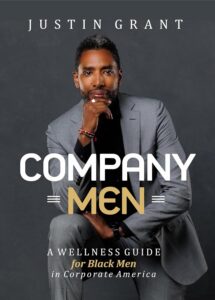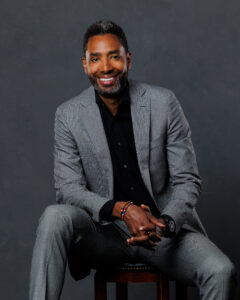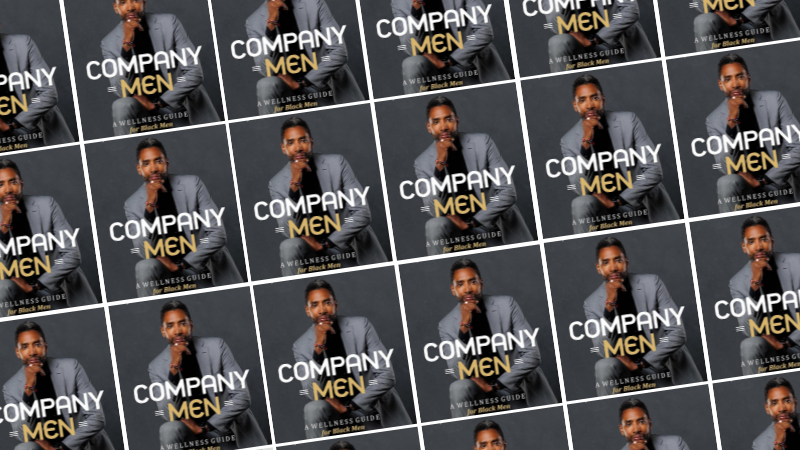 In “Company Men: A Wellness Guide for Black Men in Corporate America” (Wordeee, Feb. 12, 2025), Justin Grant draws on his two-decade career in journalism and corporate communications to deliver a groundbreaking resource tailored to the unique challenges faced by Black men in corporate spaces.
In “Company Men: A Wellness Guide for Black Men in Corporate America” (Wordeee, Feb. 12, 2025), Justin Grant draws on his two-decade career in journalism and corporate communications to deliver a groundbreaking resource tailored to the unique challenges faced by Black men in corporate spaces.
Corporate America brings with it many advantages that make it an attractive career path. Six-figure salaries, generous health benefits, and a path to retirement, if you’re fortunate enough to go the distance. But building a lasting and rewarding career in corporate America is difficult no matter what your racial or gender background happens to be. From navigating office politics to dealing with difficult bosses and co-workers, while managing the anxiety-inducing realities of layoffs and reorgs—all while working to secure your financial future —corporate life is not for the faint of heart.
While there are over 20 million books sold yearly on how to manage corporate life, “Company Men” is one of the few to speak directly to Black professional men in addressing the unique challenges they face in maintaining their well-being across various spectrums (mental, physical, social, and financial). “Company Men” offers the help and tools Black men need to extract the benefits of working in corporate America while minimizing the physical and psychological effects of the challenges that come from being a person of color in these spaces.
“Justin has delivered a must-read for every Black man who works in corporate America. Period.” – Ian Dunlap, founder of Red Panda Academy
“Company Men: A Wellness Guide for Black Men in Corporate America”
Justin Grant | Feb. 12, 2025 | Wordeee | Business Nonfiction
Hardcover | ISBN: 978-1-959811-79-4 | $32
Ebook | $14.95

Justin Grant is a communications expert and journalist with an extensive track record of delivering compelling storytelling to diverse audiences through a variety of platforms, including news media, marketing, and public relations. Over the last 20 years, Grant has honed these skills as a news reporter for Thomson Reuters and ABC News and as a corporate communications professional for leading U.S. financial services firms, including Fidelity Investments, Goldman Sachs, and JPMorgan Chase. He’s also provided commentary for National Public Radio and has published articles in numerous outlets, including Huffington Post. As an African American, Grant has contributed key perspectives to financial services firms on how to leverage authentic messaging and use the power of Black media to attract, engage, and convert Black consumers. He is currently the Executive Director of JPMorgan Chase Advancing Black Pathways, where he devises strategies to strengthen the economic foundations of Black communities around the world. He serves as a mentor to numerous students and young professionals of varying backgrounds, both in the United States and Brazil, and sits on the Board of Trustees at Long Island University, where he has taught journalism. Grant lives in the suburbs of New York with his wife and three children. Find out more about him at CompanyMen.org.
Follow Justin on LinkedIn: @jpaulgrant
“Through Company Men, Justin offers a valuable roadmap for Black men to maximize their leadership, and at the same time, embrace the trials and triumphs of corporate life. Every Black male professional – whether newly minted or seasoned veteran – should read this book and apply its lessons for longevity and success.” — Derek Dingle, Chief Content Officer at Black Enterprise
“Getting a foot in the door with the world’s leading corporations is just half the battle for Black talent. Building a lasting, rewarding, and enjoyable career is the ultimate goal. Through Company Men, Justin provides Black men with the blueprint.” — Frank Holland, Reporter, CNBC
In an interview, Justin Grant can discuss:
- A Call to Action for Leaders – Organizations must actively foster environments that reduce undue stress and promote health equity, particularly for underrepresented groups.
- The Hidden Costs of Code Switching – Code switching — shifting behaviors, speech, and attitudes to match dominant cultural norms — is a survival tool for many Black professionals.
- Avoiding the “Angry Black Man” Stereotype – For Black men, especially in corporate spaces, there’s a heightened pressure to manage emotions and reactions to avoid being labeled as the “Angry Black Man.”
- The Weathering Effect – This refers to the cumulative toll of stressors faced by people of color, eroding health over time. Examples include corporate pressures, systemic racism, and high-stakes career environments that often go unnoticed until they manifest as serious health conditions.
- Knowing Your Worth and Demanding It – Black men often earn less than their white counterparts due to systemic racism and cultural expectations that discourage negotiation.
- The Art of Picking Your Battles – One of the keys to success in corporate America is knowing what hills are worth dying on. Not every conflict or challenge is worth escalating — sometimes, stepping back is the smartest move.
- Survival of the Most Adaptable – Commit time and resources to self-improvement and mastering new skills. Stay curious and open to acquiring new knowledge. Define your value by your contributions, not your job title.
- Building a Career Roadmap – Justin encourages professionals to seek happiness and purpose at work, reminding them that they have the power to shape their futures.
- The Power of Professional Networks – Seek experienced professionals who can provide advice, share wisdom, and guide career decisions.
- Practical Advice for Thriving Amid Challenges – Prioritize rest as a foundation for physical and mental health, eat better, seek a career that aligns with personal values, seek proactive healthcare tailored to individual needs, address emotional and psychological challenges with professional support, build meaningful, supportive relationships and maintain strong social connections.
An Interview with Justin Grant
What are the most common barriers Black men face when trying to advance in corporate environments, and how can they overcome these challenges?
In doing research for my book, I’ve learned that the higher Black men climb up the socioeconomic ladder, the greater the likelihood of them developing anxiety and depression. In addition, Black men have the second-lowest life expectancy of any group in the United States and achieving a higher socioeconomic and professional status is not providing the protective shield around Black men’s lives that one would assume it would for higher earners, such as those who work in corporate America.
How can Black men effectively build and leverage professional networks in industries where they may be underrepresented?
Challenge yourself to make three to five friends in the office. Find your tribe within the company. These are the people who you vibe with on an intellectual and social level, no matter what background they may happen to be from.
What role does mentorship play in the success of Black men in corporate settings, and how can one find a mentor in environments where diversity may be lacking?
Mentorship is a big part of how we grow as human beings. We all need someone to model ourselves after as we find our way in life, both personally and professionally. On a more basic level, we also need folks around us who are experienced in successfully navigating the challenges that we’re going to face in our work.
How should Black men navigate micro-aggressions and implicit biases in the workplace without jeopardizing their careers or mental health?
One of the worst things you can do in this scenario is remain silent and quietly stew in anger. In moments like these, you’ve got to speak up — with tact. In some of these instances, the offender may not even be aware that they’ve done anything wrong. Use these moments as teachable moments. But don’t ever stay silent and try to choke away any anger you may feel over a microaggression. Doing so will be corrosive to your psyche over time.

A former award-winning journalist with national exposure, Marissa now oversees the day-to-day operation of the Books Forward author branding and book marketing firm, along with our indie publishing support sister company Books Fluent.
Born and bred in Louisiana, currently living in New Orleans, she has lived and developed a strong base for our company and authors in Chicago and Nashville. Her journalism work has appeared in USA Today, National Geographic and other major publications. She is now interviewed by media on best practices for book marketing.


